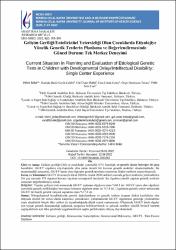Gelişim geriliği/entellektüel yetersizliği olan çocuklarda etiyolojiye yönelik genetik testlerin planlama ve değerlendirmesinde güncel durum: Tek merkez deneyimi

Göster/
Erişim
info:eu-repo/semantics/openAccessAttribution-NonCommercial 3.0 United Stateshttp://creativecommons.org/licenses/by-nc/3.0/us/Tarih
2022Yazar
Bolat, HilmiÇelebi, Hamide Betül Gerik
Bolat, Gül Ünsel
Geniş, Esra Çolak
Demircan, Özge
Çam, Fethi Sırrı
Üst veri
Tüm öğe kaydını gösterÖzet
Giriş ve Amaç: Gelişim geriliği (GG) ve entelektüel yetersizlik (EY) fenotipik ve genetik olarak heterojen bir grup
hastalıktır. GG/EY olguların etiyolojisinde altta yatan önemli bir kısmını genetik nedenler oluşturmaktadır. Bu
araştırmadaki amacımız, GG/EY tanısı olan olguların genetik tanılama oranlarına ilişkin verilerin araştırılmasıydı.
Gereç ve Yöntemler: GG/EY ön tanısıyla Ocak 2020 ile Aralık 2020 tarihleri arasında gelişim testlerine yönlendirilen
0-6 yaş arasında 578 olgunun hastane kayıtları retrospektif incelendi. Bu olgulara yönelik yapılan genetik testlerin
sonuçları değerlendirmeye alındı.
Bulgular: Yapılan gelişim testi sonucunda GG/EY saptanan olguların oranı %68,3 idi. GG/EY tanısı alan olguların
içerisinde genetik polikliniğine başvuruda bulunan olguların oranı ise %7,4 idi. Uygulanan genetik testler sonucunda
GG/EY ile ilişkili genetik varyant saptanma oranı %37,9 idi.
Sonuç: Nörogelişimsel bozukluklarda genetik değerlendirme ve genetik testlere ulaşıma ilişkin kısıtlılıklar tüm
dünyada önemli bir sorun olarak karşımıza çıkmaktadır. Çalışmamızda GG/EY olgularının genetiğe yönlendirme
oranı ulaşılabilir birçok ülke verileri ile kıyaslandığında düşük olarak saptanmıştır. Ülkemizde GG/EY tanılı olgular
için uygun genetik danışmanlığı sağlamak, prognozu belirleyebilmek ve gelecek nesillere yönelik birincil koruma
sağlayabilmek için ülke genelinde uygulanabilecek sağlık politikalarına ihtiyaç duyulmaktadır Objective: Developmental delay (DD) and intellectual disability (ID) are a phenotypically and genetically
heterogeneous group of diseases. Genetic causes constitute an important part of the underlying etiology of DD/ID
cases. Our aim in this study was to investigate the data on the genetic diagnosis rates of cases with DD/ID.
Materials and Methods: Hospital records of 578 cases aged 0-6 years, who were referred to developmental tests
between January 2020 and December 2020 with a preliminary diagnosis of DD/EY, were retrospectively analyzed.
The results of genetic tests for these cases were evaluated.
Results: The rate of cases with DD/ID as a result of the developmental test was 68.3%. Among the cases diagnosed
as DD/ID, the rate of the cases who applied to the genetic polyclinic was 7.4%. As a result of the applied genetic tests,
the rate of detection of genetic variants associated with DD/ID was 37.9%.
Conclusion: Restrictions on genetic evaluation and access to genetic tests in neurodevelopmental disorders are an
important problem all over the world. In our study, the rate of referral to genetics of DD/ID cases was found to be low
when compared to the data of many available countries. In our country, health policies that can be implemented
throughout the country are needed in order to provide appropriate genetic counseling for cases diagnosed with DD/ID,
to determine the prognosis, and to provide primary protection for future generations.
Kaynak
Celal Bayar Üniversitesi Sağlık Bilimleri Enstitüsü DergisiCilt
9Sayı
2Koleksiyonlar
Aşağıdaki lisans dosyası bu öğe ile ilişkilidir:


















